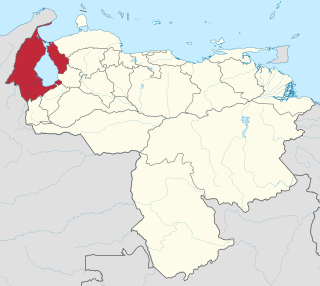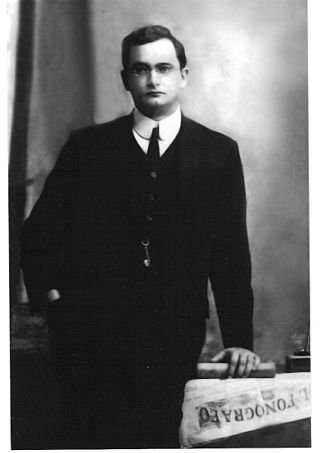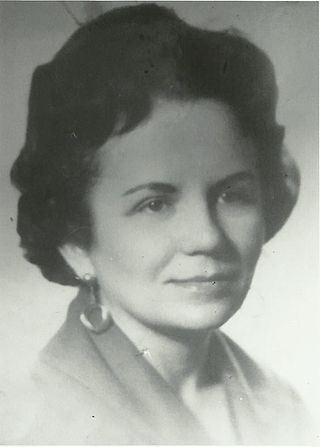
El Zulia Ilustrado (The illustrated Zulia) was the first Venezuelan magazine and one of the most prominent in Venezuela in the later 19th century. It was the first Venezuelan periodical that printed illustrations and photographs.

El Zulia Ilustrado (The illustrated Zulia) was the first Venezuelan magazine and one of the most prominent in Venezuela in the later 19th century. It was the first Venezuelan periodical that printed illustrations and photographs.
El Zulia ilustrado was founded in Maracaibo by editor and journalist Eduardo López Rivas, who created the magazine to promote the state of Zulia. The first issue was published on October 24, 1888, on the occasion of the one hundredth anniversary of the birth of local hero Rafael Urdaneta [1]
The magazine was edited in López Rivas own publishing house, Imprenta Americana (American Press) and it circulated inside and outside Venezuela. The last issue of El Zulia ilustrado was published in December 1891. [2]
El Zulia ilustrado has an important place in the history of the Press in Venezuela because it was the first Venezuelan magazine and the first periodical of the country that printed íllustrations and photographs. [3]
It was an elegant monthly magazine, made on glossy paper. Every issue included drawings of a variety of subjects related to the history and culture of the Venezuelan state of Zulia. Drawings of local heroes, Zulia wildlife, views of the city of Maracaibo or countryside landscapes were all made by López Rivas himself, a professional artist educated in France. [4] [5]

Zulia State is one of the 23 states of Venezuela. The state capital is Maracaibo. As of the 2011 census, it has a population of 3,704,404, the largest population among Venezuela's states. It is also one of the few states in Venezuela in which voseo is widespread. The state is coterminous with the eponymous region of Zulia.

Maracaibo is a city and municipality in northwestern Venezuela, on the western shore of the strait that connects Lake Maracaibo to the Gulf of Venezuela. It is the second-largest city in Venezuela, after the national capital, Caracas, and the capital of the state of Zulia. The population of the city is approximately 2,658,355 with the metropolitan area estimated at 5,278,448 as of 2010. Maracaibo is nicknamed "The Beloved Land of the Sun".

El Teatro Baralt is a theatre in downtown Maracaibo, Venezuela, at the northwestern corner of the historic Plaza Bolívar. The first theatre at the site was built in the mid 19th century as a small performance hall, with subsequent theatre buildings there having seen many different reconstructions.

The Águilas del Zulia is a Venezuelan professional baseball team based in Maracaibo which plays in the Venezuelan Professional Baseball League.

A New Era is a centre-left political party in Venezuela. It received 11% of the vote in the 2008 regional elections. The party arose in Zulia State, Venezuela's most populous, and remains far stronger in its home region than elsewhere in the country, providing the state governor since 2000 and the mayor of its largest city, Maracaibo.

Eduardo López Rivas was a Venezuelan editor and journalist. He founded and directed several Venezuelan publications throughout his life, among them the newspaper Diario El Fonógrafo and the magazine El Zulia ilustrado. He was the founder and owner of a Venezuelan editorial house, Imprenta Americana, the first publishing house to print photographs in Venezuelan periodical publications.
Carlos Arturo López Bustamante (1890–1950) was a Venezuelan journalist. He was born in Maracaibo, Venezuela in 1890 and died in Chicago, USA in 1950. He was known for his fierce opposition to the dictator Juan Vicente Gómez from the pages of Diario El Fonógrafo newspaper. López Bustamante was the son of journalist Eduardo López Rivas, editor and owner of the Maracaibo newspaper, Diario El Fonógrafo, the magazine El Zulia ilustrado and the publishing house Imprenta Americana. His mother was Doña Carmen Bustamante López, niece of Venezuelan physician Francisco Eugenio Bustamante and a descendant of General Rafael Urdaneta. Doña Carmen died when Carlos was only a child.

Eduardo López Bustamante was a Venezuelan journalist, lawyer and poet. He was a leading intellectual of the Zulia State, Venezuela, and a figure within Venezuelan jurisprudence.

Teresa López Bustamante was a Venezuelan journalist, founder of the catholic Venezuelan newspaper La Columna.

Imprenta Americana was the first publishing house that printed illustrations and photographs in Venezuelan periodicals. It was founded by editor and journalist Eduardo López Rivas, in Maracaibo, Venezuela, in 1881.

Diario El Fonógrafo was one of the most prominent Venezuelan newspapers in the later 19th century and early 20th century. It was founded in 1879 by editor and journalist Eduardo López Rivas in Maracaibo, Zulia state, Venezuela.

Nora Bustamante Luciani was a Venezuelan physician, historian, writer and intellectual, who served as the president of the Venezuelan Association of the History of Medicine, the first woman to hold the post. For 16 years she was Director of the Historical Archive of Miraflores, a dependency of the Presidential Palace that preserves the history of the presidents of Venezuela.
Marta Colomina Reyero is a Spanish-Venezuelan journalist and retired college professor. For two decades she taught journalism in her alma mater, the University of Zulia. During the 1980s she was president of the Venezuelan state television channel, Venezolana de Televisión, and held a column of opinion in the newspaper El Universal for almost twenty years. Since 2014, she has written for the newspaper El Nacional.

Betty Cecilia Lugo González was a Venezuelan philanthropist who started Special Education in the eastern region of Zulia State and founded the first Zulia state association for people with depression and bipolar disorder. She was also co-founder of the charity association "La Casa de la Misericordia" in Maracaibo, where she served as an active benefactress for 25 years.

The Return is a 2013 Venezuelan film directed by Patricia Ortega. The first Zulian film of this millennium, it premiered on 30 August 2013 in commercial cinemas in Venezuela.

Manuel Trujillo Durán was a Venezuelan photographer who pioneered film in Venezuela. Trujillo was most successful as a photographer, though he dabbled in other industries and is best remembered for his connections to the fledgling film industry in Venezuela. He became one of the first people from Latin America to learn how to show films; he was thought for many years to be the director of Venezuela's first films, and traveled through Venezuela and Colombia with projectors to introduce cinema to this part of the South American continent.

Un célebre especialista sacando muelas en el gran Hotel Europa was the first Venezuelan film. It was screened at the Baralt Theatre in Maracaibo, Zulia on 28 January 1897 as the second in a film block of four; the block also featured another film from Maracaibo. Little is known about the film's production, and scholars are uncertain of the identity of its director.

The Luxburg-Carolath Cemetery, commonly known as El Cuadrado is a privately owned cemetery located in Maracaibo, Zulia, Venezuela. It is one of the oldest operating cemeteries in the country, and has over 10,000 interments.

Luis Fernando Rojas Chaparro was a Chilean illustrator, lithographer and caricaturist.
Esteban Novaro is an actor and television presenter, known for his work as the protagonist of the Carolay series, broadcast internationally by Ve Plus and Venevisión. In 2021, he received the Mara International Award for Actor of the Year.